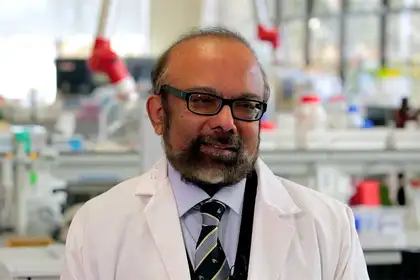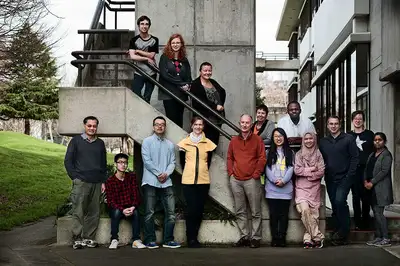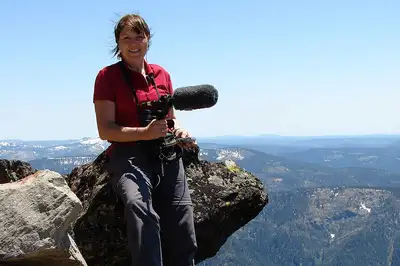
Professor Velmurugu (Ravi) Ravindran, individual winner of this year's Massey University Research Medal.
Professor Velmurugu (Ravi) Ravindran of the School of Veterinary Sciences has been named the individual winner of this year’s Massey University Research Medal. The Team Medal goes to the Food Microbiology Biofilm Research Team of Massey’s Institute of Food Science and Technology.
The medals honour an exceptional body of research carried out by staff over a period of years.
Head of the Institute of Natural and Mathematical Sciences, Professor Dianne Brunton, has been awarded the Individual University Supervisor Medal, and the early career university medal also coming from her college for Dr Alexander Melnikov.
Professor Ravindran is a world leader in poultry nutrition. He is widely acknowledged as a researcher who laid the foundations for much of the current understanding of feed enzyme technology – maximising the utilisation of available feed resources and lowering the environmental impact from animal production. However, he also made great strides in nutrient metabolism, feed evaluation, amino acid availability, gut flora management and early nutrition in poultry.
Professor Ravindran’s scholarly contributions to this area of research have been documented in more than 550 scientific works, including 267 peer-reviewed publications, six books and 36 book chapters. In 2015, he was the recipient of McMeekan Memorial Award and Massey’s Research Medal – Individual College Research Award.
Acting head of the School of Veterinary Sciences, Professor Paul Kenyon says Professor Ravindran’s pioneering and creative works have yielded clear benefits to the efficiency of intensive animal agriculture.
“He is not only the leader of the Massey University poultry research team, he is clearly a world leader.”

Professor Steve Flint and members of the Food Microbiology Biofilm Research Team.
Team medal
The Food Microbiology Biofilm Research Team, led by Professor Steve Flint and Dr Jon Palmer, has been a powerhouse at Massey since its creation in 1996.
Biofilms are slimy clusters of bacteria that cling to surfaces and cause significant problems in the food industry, including food spoilage and the risk of potentially serious illnesses such as listeria.
The team has provided valuable support to a wide range of New Zealand industries with the majority of their work focused on understanding biofilm growth in the dairy industry, and a recent branching out to other parts of the food industry such as meat, seafood and fruit and vegetables.
They have assisted in industry investigations, including the Fonterra Clostridium botulinum scare in 2013 and the Listeria contamination of lettuce at Leaderbrands in 2017.
Success in both fundamental and applied research has been achieved with the team averaging 10 PhD students, six multi-disciplined academics and many international collaborators.
Since 2006, the team has contributed to 20 book chapters, produced 100 peer-reviewed publications, and 93 conference presentations. They are internationally recognised for their research, being invited to present their work at the International Biofilm Summit, the American Dairy Science Association conference and the China International Food Safety and Quality conference in 2017.

Professor Brunton in the field.
Supervisor medal
Professor Brunton’s supervision of 14 PhDs and 18 Masters completions since joining Massey in December 2004 speaks for itself, with an average of one postgraduate thesis completion every five months. She is currently Head of the Institute of Natural and Mathematical Sciences and supervisor to seven PhD and three MSc students, and co-supervisor to 11 other postgraduates.
An ecologist with more than 120 scientific publications, Professor Brunton’s research encompasses expertise on native birdsong and conservation of New Zealand birds with an impressive academic output. This work has drawn many students with equal passion to her studies, which she has been able to support with some of the $1.8 million of funding she has achieved at Massey, including Marsden funding on two occasions, which allowed her to achieve four PhD completions as well as a further three she is currently supervising.
Professor Brunton has attracted postgraduate students from 14 countries to work on a diverse range of research in ecology and conservation biology.
She has also made significant overall contributions to postgraduate study at Massey; as the Director of Postgraduate Studies within her institute, as a member the Postgraduate Management Committee within the College of Sciences, and as a Doctoral Convenor for the Graduate Research School.
Early career
Dr Alexander Melnikov works within the field of computability theory with applications in algebra, developing several research topics including a new approach to computable analysis via non-standard computation models; and a new subject of “primitive recursive” algebra.
Dr Melnikov has published over 20 research papers in two years in international journals such as the Journal of Algebra, and solved technical problems in the field, including a 60-year-old problem posed by the famous Russian mathematician Maltsev.
College of Sciences Deputy Pro Vice-Chancellor (Research) Distinguished Professor Gaven Martin says, “without a doubt Dr Sasha Melnikov is one of the very strongest young mathematicians working in New Zealand, and internationally.
“His work is in the area of mathematical logic and effective algebra, and intersects aspects of theoretical computer science – an area of strategic importance to Massey at its Albany Campus. I have no doubt that Dr Melnikov is on track to be a leading mathematical scientist and is a very strong candidate for this award.”
Impact on University
College of Sciences Pro Vice-Chancellor Professor Ray Geor says the four awards show the strength of Massey sciences and reflect excellence in speciality areas as well as the standing and connectivity of our people in both New Zealand and overseas. “The relationships our people have in international research and learning communities is what makes Massey world-leading.”
The research medals and awards will be presented at the Defining Excellence awards early in 2018.